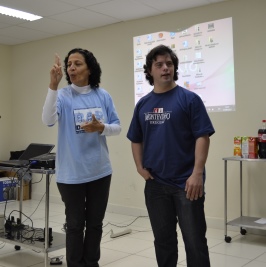 School health and inclusion in practice: iiDi in Latin America
School health and inclusion in practice: iiDi in Latin America
Since 2006, the
Institute on Disability and Inclusive Development (iiDi) has been developing inclusive school health activities in Uruguay and Brazil to advance inclusvie school and community health programmes in the countries.
The initiative which has been supported by the Partnership for Child Development has over the years mobilized a significant number of partners and networks for sustained collaboration over the years including, Ministries of Education and Health, the National AIDS Programme, local government education authorities and Organizations of People with Disabilities.
So far the initiative has carried out the following activities:
Making health education inclusive of school children with disabilities
In 2012, an action research project was conducted in Uruguay in collaboration with special education schools and the National Sex Education Program. The research aimed at responding to a wide spread need for content, methodologies and support in this largely neglected area and identified entry points (in curriculum, school improvement projects and teaching practice) for sex and STD preventive education of children with disabilities.
Outcomes of the project include:
-
More than 100 special education teachers, school principals and educational specialists discussed the results of the study and
validated the emerging recommendations.
-
More than 150 special education teachers were trained in the implementation of school health initiatives that are inclusive of children with disabilities
-
A book for parents on sex education of children with different disabilities was produced (and a tagged digital version makes this publication accessible to the visually impaired). The Argentinian MoE is currently making minor modifications for a local publication of this book and other materials developed by this project.
-
A copy of this book is now available in every special school throughout Uruguay.
-
The results of the study were presented in education and health conferences in Argentina, Brazil and Mexico.
Involving children with disabilities and their families in HIV education
Like any others, children with disabilities require information on HIV and AIDS and access to programmes, services, and resources. Young people with disabilities are not asexual, and without adequate information and support for prevention, they are highly vulnerable to abuse and consequently to infection, especially in contexts of high HIV prevalence. However, to date there have been few HIV interventions that have directly targeted (or indirectly included) children and adolescents with disability.
With support from PCD, UNFPA, UNICEF and others, the iiDi is working towards a sharpened focus on equity and reaching the most marginalized, and have identified adolescents with disability as an important group to be taken into account for the formulation of effective and equitable responses to the spread of HIV.
In 2012 and in partnership with disability organizations in Uruguay iiDi conducted HIV workshops with three groups of adolescents with disabilities (deaf, blind or those who have down syndrome) and with one group of parents of children with down syndrome. The teens developed information, education and communication resources for awareness, education and communication campaigns with a focus on the use of accessible and diversity-oriented formats, for example in braille, sign language and simplified language/iconographic. It was a very brief intervention focused on generating showcases for how organizations who work with adolescents with disabilities can address the subject and generate resources to replicate the strategy.
Four prototypes of resources were produced:
-
A video explaining means of HIV transmission and preventive measures in Uruguayan sign language - 1st video below
-
A video for educators that work with children with Down Syndrome - 2nd video below (improvements to captions on this video are ongoing)
-
A computers and mobile phone game programme for increased accessibility for blind adolescents on being tested for HIV
-
An awareness campaign for parents of children with down syndrome (poster)
Promoting preventive messages in sign language
A lack of appropriate materials in their own language, social taboos and numerous barriers to information and communication put young people with hearing impairments at a higher risk of sexually transmitted diseases and HIV.
In December 2012 and throughout 2013 iiDi organized several workshops for adolescents with hearing impairments to discuss strategies and prepare resources in Uruguayan Sign Language (USL) to deliver messages on HIV education and access to health services. To further disseminate these resources iiDi worked with local deaf organizations to distribute these materials to deaf institutions and networks. The activities also aimed to engage deaf adolescents as health promoters and advance their preparation for future peer education initiatives in USL.
The resources which include posters and postcards with key information on the back, and a link to more info using QR codes (increasingly used by deaf adolescents to access information in sign language) can be accessed through
iiDi's Facebook Page.
In October 2013, iiDi received a Special Nomination for Human Development after been nominated for a National Innovation Award by the Uruguayan Agency on Research and Innovation for its work with deaf young people to develop IEC resources in sign language and make health information and education accessible to the hearing impaired population.
Opportunities for collaboration in Lusophone Africa

